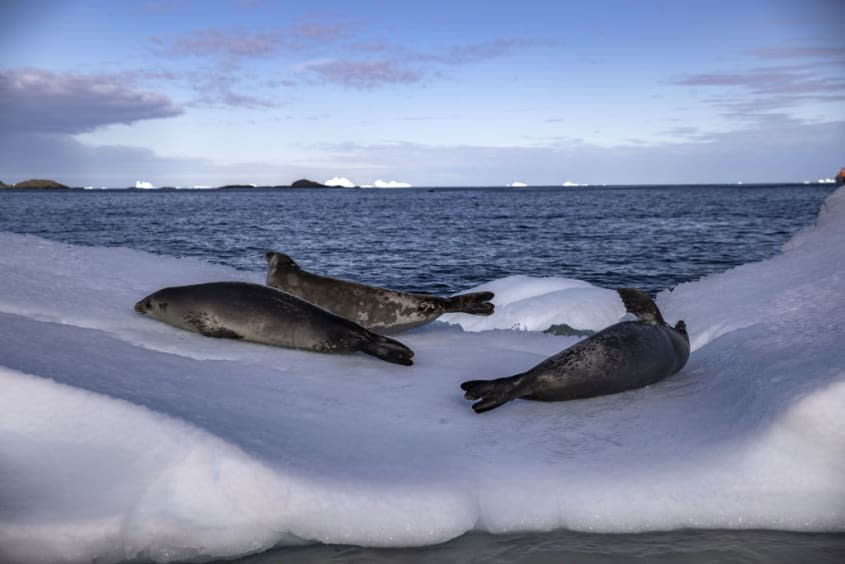How Antarctica has become the enduring climate change bellwether

The effects of climate change are undeniable, with sweltering heat waves across the United States and massive flooding destroying entire homes. However, this is not unique to the U.S., as climate change has been altering the landscapes of every continent, including the most remote one, Antarctica.
While the desolation of Antarctica's polar desert leads to it often being overlooked, the world's southernmost continent "has been one of the most rapidly warming parts of the planet" over the last 50 years, Discovering Antarctica reported. Not only is it heating up, but Antarctica's circumpolar current is "warming more rapidly than the global ocean as a whole."
Antarctica's climate change issues were recently highlighted by a new study from the journal Frontiers in Environmental Science. The study, co-authored by experts from the University of Exeter, the British Antarctic Survey, the University of Johannesburg and others, concluded that it's "virtually certain that future Antarctic extreme events will be more pronounced than those observed to date" unless steps are taken to abate climate change.
Melting sea ice
One of the biggest issues in Antarctica is undoubtedly the rapid melting of its ice. It was recently reported that sheets of Antarctic ice are melting three times as fast as they did 30 years ago. Sea ice levels hit a record-low in 2017, and "the four lowest annual minimum sea ice extents of the satellite era have occurred since, with both 2022 and 2023 setting new records," the study said.
Antarctic sea ice loss "varies regionally," the study reported, and its effects have been particularly seen in the Ross and Amundsen-Bellingshausen Seas, which "had near-record low extents with little ice remaining" by February 2023. The loss of sea ice can lead to "further absorption of solar heat due to a reduction in surface reflectivity, [and] so too may persistent Antarctic sea ice reductions lead to enhanced warming."
Threats to biodiversity
Many of the animal ecosystems in Antarctica may be affected by climate change, as extreme weather events take a toll on "terrestrial (including freshwater) ecosystems and biodiversity," the study said. This can be especially harmful because land-based marine mammals, such as penguins and seals, "provide an important transfer of nutrients onto land, which can be a major driver of terrestrial biodiversity," the study added. When these animals are threatened, it will have "direct impacts on terrestrial biota which rely on the nutrient supply."
Ocean-dwelling animals may also face similar challenges. "The life that calls this region home relies on this icy landscape for survival," said Chris Johnson of the World Wildlife Fund, noting that sea ice in Antarctica is more than just frozen water. "It is as essential as trees are to land, and without it, many species couldn't exist."
Warnings about biodiversity problems go back years. In 2012, a study from the British Ancatric Survey noted that there "may be increased risk to the biodiversity of this frozen world," especially since tourism to Antarctica continued to bring new invasive threats to the region.
Heat waves
While Antarctica is usually associated with extreme cold, the overarching issue continues to be the continent's rising temperatures. While hot weather has taken over the summer, there's "yet to be as great an appreciation of the occurrence and impact of extreme events in Antarctica," the study reported.
There's conclusive evidence that the temperature in Antarctica is rising, according to the study. The most extreme heat wave ever seen globally, the study stated, "occurred over East Antarctica in March 2022 when surface temperature anomalies of up to [101.3 degrees Fahrenheit] were observed." The highest-ever temperature on the Antarctic mainland was recorded in February 2020, when a reading of 64.9 degrees Fahrenheit was observed.
As these heat waves continue, Antarctica could be "in the process of changing from being the planet's refrigerator to the planet's radiator," The Times reported. This is largely due to melting ice hindering Antarctica's ability to reflect sunlight. When ice is replaced by dark sea water, "that reflecting ability is reduced, and the Earth absorbs that heat," Professor Martin Siegert of the University of Exeter told The Times.
Despite efforts to slow these heat waves, the environment of Antarctica will "become ever more affected" if countries continue to "explore, extract and burn fossil fuels anywhere in the world," Siegert told the Financial Times.

